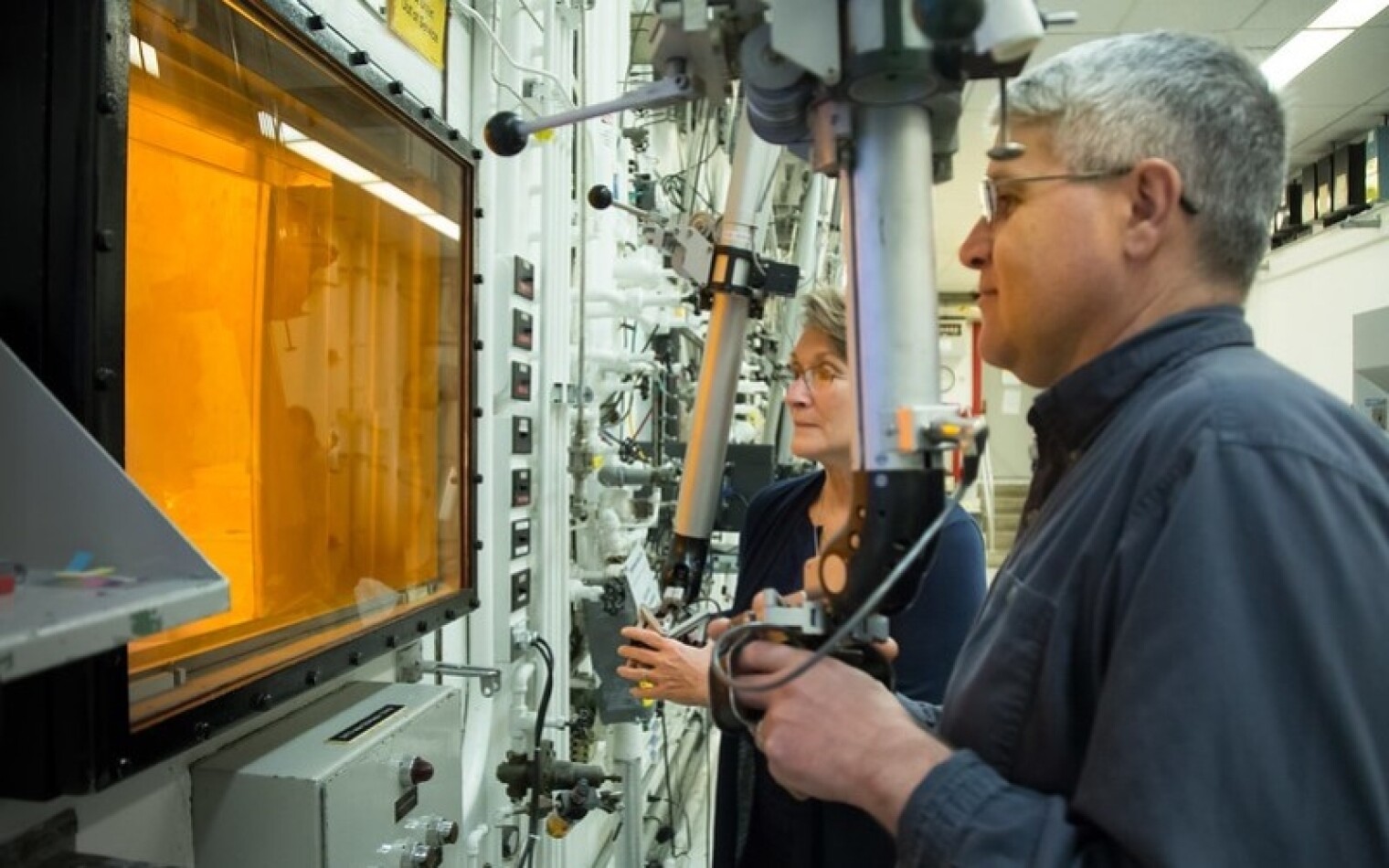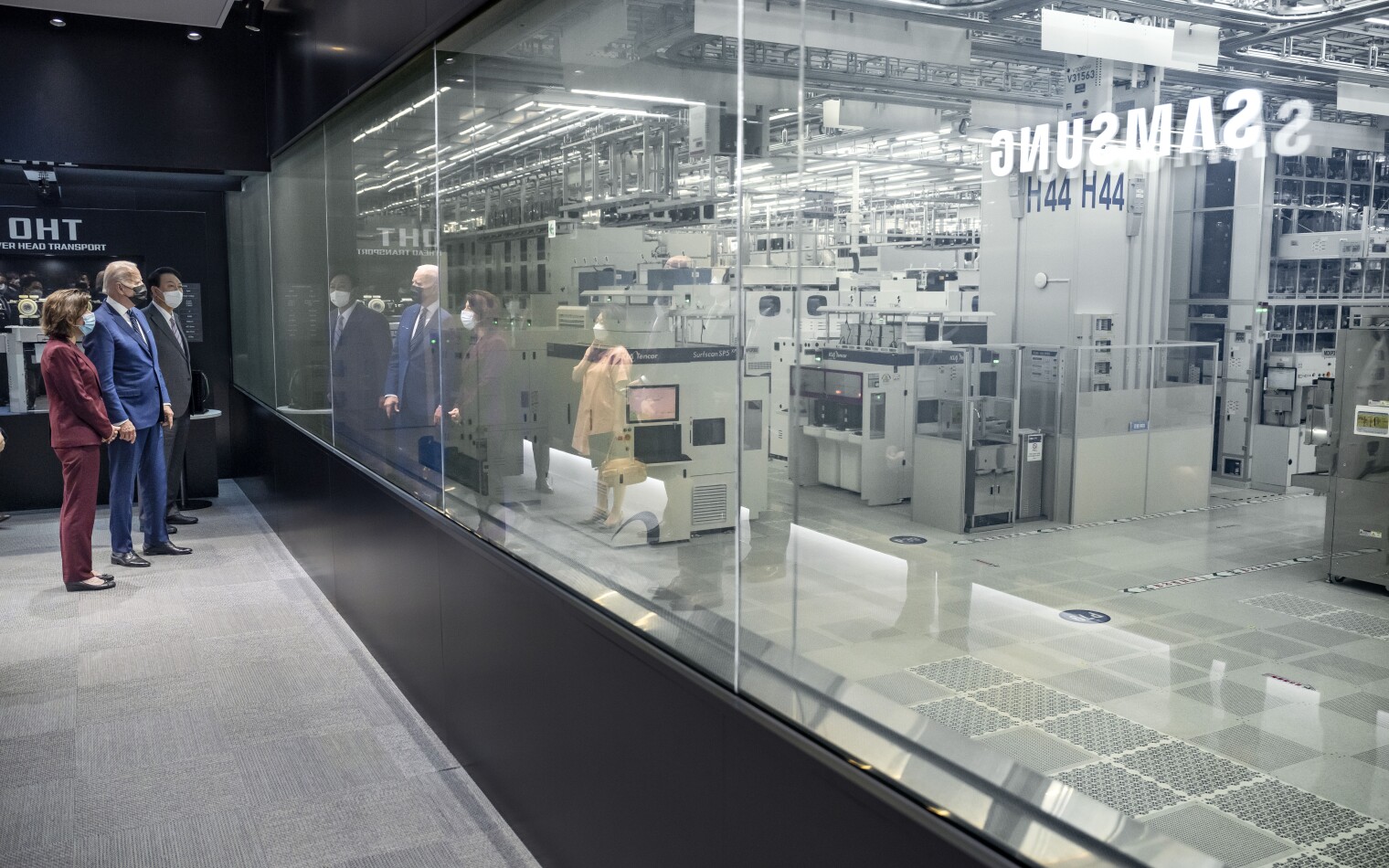| |
| FYI: Science Policy News from AIP |
| THIS WEEK |
|
|
|
|
|
|
| What’s Ahead |
 |
| Equipment for producing actinium-227, an isotope used in cancer treatment. The supplemental security spending bill that Congress is poised to pass includes money to ramp up production of critical isotopes to mitigate supply disruptions caused by Russia’s invasion of Ukraine. (Oak Ridge National Lab) |
National Security Spending Package Heads to Senate
The House passed supplementary funding bills over the weekend that contain about $61 billion in support for Ukraine, $26 billion for Israel, and $8 billion for security initiatives in the Indo-Pacific region. A small portion of the funds are for science and technology-related initiatives. The Ukraine bill includes $98 million for the Department of Energy’s Office of Science to procure equipment for producing critical isotopes that were previously sourced from Russia. It also contains $143 million for nuclear nonproliferation efforts by DOE and $632 million for research, development, test, and evaluation projects at the Department of Defense. The Israel bill includes $5.2 billion for missile defense, of which $1.2 billion is specifically for the laser-based defense system called Iron Beam. The Indo-Pacific bill includes $7 million for RDT&E projects to improve the submarine industrial base. The package of bills had been stalled in the House for months due to opposition from a bloc of Republicans who are critical of providing further assistance to Ukraine. With that hurdle clear, the bills are now expected to pass the Senate, where there is less opposition to providing further aid.
PCAST to Propose AI Uses in Science
The President’s Council of Advisors on Science and Technology will meet Tuesday to consider approving a report on the potential for artificial intelligence tools to accelerate the progress of science. President Joe Biden requested the report in his October executive order on AI, which instructed PCAST to study the potential of AI to address “major societal and global challenges.” He also asked for the report to identify “issues that may hinder the effective use of AI in research and practices needed to ensure that AI is used responsibly for research.”
Future of US Nuclear Science Facilities Up for Discussion
The Nuclear Science Advisory Committee will meet Friday to review a draft report recommending priorities for the next decade of nuclear physics facilities funded by the Department of Energy. Produced by an NSAC subcommittee at DOE’s request, the report lists the Electron-Ion Collider and Ton-Scale Neutrinoless Double-Beta Decay Campaign as “absolutely central” to maintaining U.S. leadership in the field, the highest level of importance in the criteria rubric set by DOE. The remaining five projects that DOE asked the panel to review are all listed as “important,” the second-highest level. The committee concluded that all but two of the seven projects are ready to commence construction: the Project 8 neutrino mass measurement effort and the Electron-Ion Collider Detector II, for which it finds their missions and technical requirements are “not yet fully defined.”
|
|
| In Case You Missed It |
 |
| From left: Commerce Secretary Gina Raimondo, President Joe Biden, and South Korean President Yoon Suk Yeol tour a Samsung electronics facility in South Korea in 2022. The Commerce Department announced in April 2024 that it plans to give Samsung $6.4 billion to expand semiconductor manufacturing facilities in the U.S. (Adam Schultz/White House) |
Huge CHIPS Grants Awarded to TSMC, Samsung, and Micron
The U.S. government indicated this month that it plans to issue grants of more than $6 billion each to Taiwan Semiconductor Manufacturing Company, Samsung, and Micron, on the heels of an $8.5 billion grant for Intel announced last month. TSMC is slated to receive a $6.6 billion grant and $5 billion in loans to help build a third chip factory in Phoenix, Arizona. A $6.4 billion grant to Samsung will help the South Korean company expand its existing facility in Austin, Texas, and build a network of four smaller fabs in nearby Taylor. Micron, a U.S. company, is poised to receive $6.1 billion to build new semiconductor plants in New York and Idaho. Intel’s grant will support factory construction and modernization projects in Arizona, New Mexico, Ohio, and Oregon. All of the grants will be funded through the CHIPS and Science Act, which created a $39 billion fund to support manufacturing incentive grants. Commerce Secretary Gina Raimondo said last week that the department plans to give out all of those funds by the end of this year. These manufacturing incentives have been in such high demand that the department has suspended plans to use a portion of the incentive funds to support R&D facilities construction or modernization.
Dragonfly Rotorcraft Mission Proceeds Despite Cost Doubling
NASA has permitted the Dragonfly rotorcraft mission to Saturn’s moon Titan to enter the final stage of design, the agency announced last week. The mission is led by the Johns Hopkins Applied Physics Laboratory in Maryland and is expected to launch to Titan in July 2028. The project had to be replanned multiple times but now has a green light to proceed to construction and testing once the final design is completed. NASA stated it now expects the mission to cost $3.35 billion, about double the proposed cost. The agency attributes the increase to a combination of the pandemic, supply chain disruptions, “in-depth design iteration,” and additional funding for a heavy-lift vehicle to shorten the travel time to Saturn. “The Dragonfly mission is an incredible opportunity to explore an ocean world in a way that we have never done before,” said Dragonfly Principal Investigator Elizabeth “Zibi” Turtle of APL in a press release. “The team is dedicated and enthusiastic about accomplishing this unprecedented investigation of the complex carbon chemistry that exists on the surface of Titan and the innovative technology bringing this first-of-its-kind space mission to life.”
NASA Administrator Testifies on Budget Challenges
NASA Administrator Bill Nelson defended spending cuts to the Mars Sample Return mission and a satellite-servicing mission called OSAM-1 during a hearing held last week by the House Appropriations Committee. NASA plans to cancel OSAM-1 due to its high cost and technical challenges, requesting just $11 million in fiscal year 2025 for close-out costs despite having already spent around $1.5 billion on the mission. While Rep. David Trone (D-MD) said the cancellation would be “catastrophic for scientific innovation in Maryland,” as the mission is led by the Goddard Space Flight Center in the state, Nelson defended the decision in light of the limited budget NASA has received from Congress. “With less money, we have to make some very tough choices,” Nelson said. Rep. Mike Garcia (R-CA) also questioned the wisdom of NASA’s decision to cut the Mars Sample Return budget, arguing the move is “cutting to the bone, and in this case, potentially amputating [the Jet Propulsion Lab].” Nelson said he was optimistic about the future of MSR and JPL, citing plans to consider new options to bring back Mars samples in a more cost-effective and timely way. Given the constraints on NASA’s annual budget, Nelson also used the hearing to repeat his hope that Congress use a supplemental spending package to pay for the construction of a deorbit “tug” for the International Space Station that will direct the station’s reentry over the South Pacific once it is retired.
House Debates Allegation that NIH Interfered in COVID Origins Research
A House subcommittee formed to investigate the origins of the COVID-19 pandemic held a hearing on April 16 to discuss the theory that leaders at the National Institutes of Health meddled in the publication of a research paper to downplay the possibility of a lab leak. The paper in question, called “The Proximal Origin of SARS-CoV-2” was published in Nature Medicine, with a related letter published in The Lancet. Subcommittee Chair Brad Wenstrup (R-OH) published a report last year theorizing that NIH leaders — including Francis Collins and Anthony Fauci — used “undue influence” to encourage the paper’s authors to argue that the pandemic was of zoonotic origin. “Rather than journals being a wealth of information and opinions about this novel virus, of which we knew so little, they helped establish a party line that literally put a chilling effect on scientific research regarding the origins of COVID-19,” Wenstrup asserted at the outset of the hearing last week. Rep. Raul Ruiz (D-CA), ranking member of the subcommittee, countered that Wenstrup’s probe “has failed to substantiate any of their claims about doctors Fauci and Collins” and worried the hearing set a “dangerous precedent that if Congress doesn’t like what you publish, you’ll be hauled in before a congressional committee to answer for it until they prove their conspiratorial narrative.” The editors-in-chief of Nature and the Lancet declined to participate in the hearing so the sole witness was the editor-in-chief of Science, Holden Thorp, who defended the integrity of the peer review process at his journal.
|
|
| Upcoming Events |
All events are Eastern Time, unless otherwise noted. Listings do not imply endorsement. Events beyond this week are listed on our website.
Monday, April 22
Tuesday, April 23
Wednesday, April 24
Thursday, April 25
Friday, April 26
Monday, April 29
Know of an upcoming science policy event either inside or outside the Beltway? Email us at fyi@aip.org.
|
|
| Opportunities |
|
Deadlines indicated in parentheses. Newly added opportunities are marked with a diamond.
Job Openings
Solicitations
Know of an opportunity for scientists to engage in science policy? Email us at fyi@aip.org.
|
|
| Around the Web |
|
News and views currently in circulation. Links do not imply endorsement.
White House
Congress
Science, Society, and the Economy
Education and Workforce
Research Management
Labs and Facilities
Computing and Communications
Space
Weather, Climate, and Environment
Energy
Defense
Biomedical
International Affairs
|
|
|
| |
| This message is sent to you because your email address is on our subscribers list. To manage your FYI preferences and subscriptions, please click here . Or you can unsubscribe from all emails from AIP. AIP, 1 Physics Ellipse, MD 20740-3841
301.209.3100 - newsletters@aipcomm.org As a 501(c)(3) non-profit, AIP is a federation that advances the success of our Member Societies and an institute that engages in research and analysis to empower positive change in the physical sciences. The mission of AIP (American Institute of Physics) is to advance, promote, and serve the physical sciences for the benefit of humanity. |
|
| © 2024. American Institute of Physics |
|
|